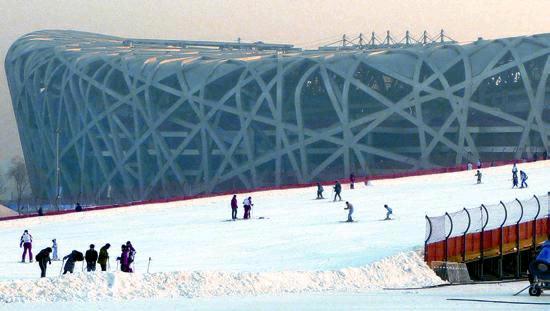Beijing 2022
2014-03-11ByYuanYuan
By+Yuan+Yuan

One of Beijings most well-known landmarks, the Birds Nest, also known as the National Stadium, is gearing up in the hope that it will have the opportunity to host Olympic events once more in 2022-but this time in winter.
“By hosting the 2022 Winter Games, we hope to fulfill the dream of hosting both the Summer and Winter Olympics in the same city,” said Yang Xiaochao, Vice Mayor of Beijing, at a press conference in Sochi, Russia, on February 8. Yang is also vice chairman of the Beijing 2022 Winter Olympics Bidding Committee.
There has never been a city to host both summer and winter games in Olympic history.
On November 3, 2013, Chinas capital announced the joint bid to host the 2022 Winter Olympic Games together with Zhangjiakou, a city with a ski resort that lies some 200 km northwest of Beijing in the neighboring Hebei Province.
This is the second time that a Chinese city has bid to host the winter Olympics. Harbin, in Chinas northeastern Heilongjiang Province, failed to make the shortlist for the 2010 Winter Olympics host city back in August 2002. The privilege eventually went to Vancouver in Canada.
“Promoting winter sports in China, and supporting the Olympic spirit have always been our guiding principle,” said Yang Shuan, Vice President of the Chinese Olympic Committee.“We are bidding for the 2022 Winter Olympics in a responsible manner.”
When speaking at a press conference in Sochi on January 7, Thomas Bach, President of the International Olympic Committee(IOC), welcomed Beijings Winter Olympic bid.“It is a concept that could motivate millions of people in the region of Beijing and beyond to practice winter sports and there would be excellent facilities,” he said.
The IOC will select the host city for the 2022 Winter Olympics at its 127th Session in Kuala Lumpur, Malaysia, on July 31, 2015.
hope
Beijings Olympic legacy is boasted as its biggest advantage.
“After the 2008 Summer Olympic Games, Beijing has been building itself into an international sports center and fully utilized its Olympic venues to stage international events one after another,” Yang Xiaochao said. “So the citys ability to hold competitions remains in effect, which is the most favored advantage for Beijing in its bid for the 2022 Winter Olympics.”Yang pointed out that the Winter Olympics is smaller in scale than the Summer Olympics, and that athletes, coaches, officials and media present at Winter Olympics total just over 10,000, which is only equal to the number of athletes alone at Summer Olympics. Only three out of the 12 planned competition venues would need to be built, Yang revealed. According to a plan announced by Yang, if Beijing wins the bid, it will build three relatively compact Olympic venue clusters. The Capital Gymnasium and the MasterCard Center in the west of downtown Beijing will hold competitions for the five ice rink-based sports including figure skating, short track speed skating, speed skating, curling and ice hockey. The opening and closing ceremonies will be staged in the National Stadium.endprint
Temporary venues will be built in the Xiaohaituo Mountain area in Beijings suburban Yanqing County, which is about 90 km northwest of the city center, for sports such as bobsleigh, luge, skeleton and alpine skiing.
Other skiing sports will be held in Zhangjiakous Chongli County.
Mayor Hou Liang of Zhangjiakou said that the snow season in the city can last for 150 days and the average temperature in winter is 12 degrees Celsius below zero, higher than the lower limit of 18 degrees Celsius below zero set by the IOC. The air quality in Zhangjiakou is also the best among all the places located north of the Yangtze River.
An express railway linking Beijing and Zhangjiakou is expected to begin construction later this year and to be completed in 2017. The 174-km-long intercity line will shorten the commute time between the two cities from more than 3 hours to only 40 minutes, according to Zhang Chunsheng, the official in charge of the bidding office under the Zhangjiakou Municipal Government.
A survey conducted by the Global Poll Center on 2,500 people above 15 years of age living in 18 Chinese cities, including Beijing, Shanghai, Guangzhou and Zhangjiakou, showed that 86.1 percent of the respondents support the decision by the two cities to bid for the Olympic Games.
When asked whether Beijing and Zhangjiakou could win the bid, 44.4 percent of the respondents said that they are confident of success, with some 44.3 percent believing there is a fair chance.
disadvantages
The biggest challenge, according to 54.7 percent of the respondents, lies mostly in issues with air quality. Even though the air quality in Zhangjiakou is good most of the time, it is merely the co-host. The smoggy air in Beijing is still a big concern.
The Ministry of Environmental Protections air quality report showed that the number of days that Beijings air quality met the required standard in the first half of 2013 was much less than the national average, and its pollution indexes for PM2.5(airborne particles measuring less than 2.5 microns) and PM10 (airborne particles measuring less than 10 microns) were much higher.
Given the importance of air quality for sports events, environmental conditions are one of the 11 important technical criteria in the selection of a city to host the Winter Olympics.
On January 23, Wang Anshun, Mayor of Beijing, declared an “all-out effort” to clean up the citys air by cutting coal use by 2.6 million tons and relocating 300 polluting companies out of the city by the end of 2014.endprint
Beijing released a five-year clean air action plan (2013-17) in September 2013. Last year, the city cut major air pollutants by more than 3 percent, eliminated 366,000
old vehicles that failed to meet the exhaust
emission standard and closed down 288 pol-yuanyuan@bjreview.com luting factories. In addition to cutting new car registrations, Beijing aims to ban all heavily polluting vehicles within the year and has intensified efforts to promote new energy vehicles.
Another challenge Beijing faces is the dilemma of the IOCs unwritten rule that a continent cannot hold two consecutive Olympics. The 2018 Winter Olympics are to be held in Pyeongchang County, South Korea. This may decrease Beijings chances for staging the 2022 Winter Olympics. Moreover, the 2020 Summer Olympics will also kick off in Asia, as they are to be hosted by Tokyo in Japan.
“There is an unwritten rule about rotating the bid,” said Li Yingchuan, chief of Beijings Sports Bureau. “Since Pyeongchang won the 2018 bid, Beijing will face a daunting task in beating the odds. The IOC has always said that there is no official geographical rotation policy. I am not an IOC member, but for me it seems less about geography and more about equal opportunity.”
“Geographical factors would not constitute a disadvantage for Beijing and Zhangjiakous joint bid for the 2022 Winter Olympic Games,” said Hasan Arat, Chairman of the Istanbul 2020 Olympic Bidding Committee. The Turkish capital lost to Tokyo in the IOC vote showdown in September. Arat noted that, rather than worrying about the geographical factors, Beijing and Zhangjiakou should focus more on playing a strong “opportunity card” to convince IOC members.
Currently, there are five other candidate cities for the 2022 Winter Olympic Games: Almaty in Kazakhstan, Krakow in Poland, Lviv in Ukraine, Oslo in Norway, Stockholm in Sweden, and Beijing. Oslo and Stockholm are regarded as front-runners in the bid.
“Every applicant city is likely to face two very different results, we believe that the bidding itself is progress,” said Yang Xiaochao.“Whether we can win the bid or not, we will continue to carry out related planning and initiatives.”endprint
